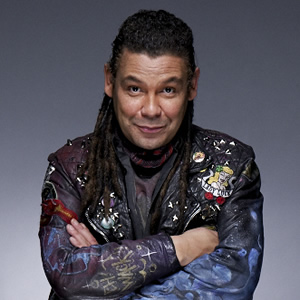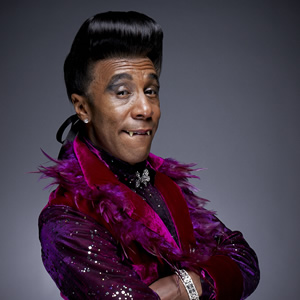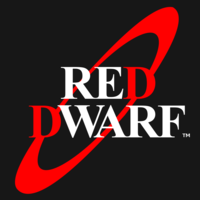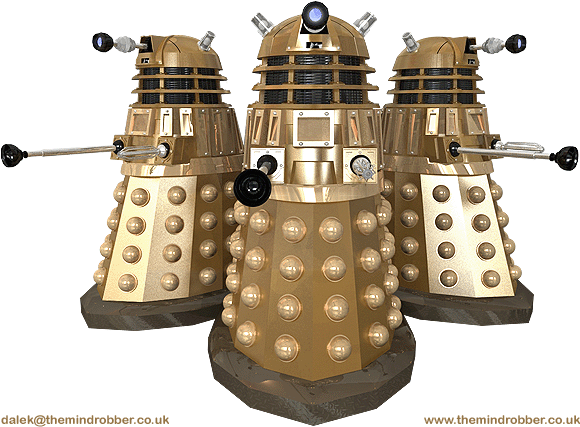
Red Dwarf stands as something of a rarity: a show that is set in space but is essentially a comedy series, while at the same time taking an (almost) serious approach to science-fiction. I don't know of any series, before or even since, that has so successfully melded the two genres into something which is so much more than the sum of its parts. Almost unique, it's certainly never been bettered, and unless you count Douglas Adams' "Hitch-hiker's guide to the galaxy", nothing has even tried. And it's not because the concept was shown to be flawed, was unsuccessful or failed at what it atttemped, as Red Dwarf has gone down as both a cult sci-fi series and a cult comedy series, though in fairness the balance does tend to be heavily on the latter.
Because of its uniqueness then, it's hard to judge it, as there's no yardstick against which to measure. Most sci-fi series can be compared to the greats, like Star Trek or Battlestar Galactica, or Babylon 5 even, while there are certainly hundreds of classic comedies you can put up against any newcomer to see if they measure up. But no show has ever straddled both genres so successfully, or indeed ever, and managed not to piss off the fans of either side. Spaced comes closest, probably, but even then that's not a sci-fi series, just references popular geek culture. Red Dwarf is set IN space, on a spaceship, and though the writers were proud to proclaim that the crew never met any aliens (which they didn't, through frankly amazingly inventive storylines) or used lasers or phasers, they manage to have the same kind of adventures as Captain Picard or Buck Rogers, albeit usually with a hilarious twist.
At its core, Red Dwarf is a story about characters, indeed one man, Dave Lister, the last human left alive. As the series gets going he surrounds himself with, well, let's not call them friends, eh? He wouldn't accept that. Let's just say they're, um, people he met. If you know the series that line will carry a little more weight than it would otherwise. Through a series of unlikely mishaps, Lister has ended up three million years in the future and light-years away from Earth, and must assume that by now either the planet is toast or at least that Man has died off or destroyed himself. His only companions, as the terrible truth begins to sink in about his isolation and what he can look forward to, are a hologrammatic simulation of perhaps the man he would least have wanted to spend the rest of his life with, a creature which was once a cat but has, over millions of years, evolved into a humanoid being, though still with the intrinsic characteristics of the household moggy and who, with trademark deadpan humour and lack of inspiration Lister names Cat, and the ship's computer.
Clear so far? Well perhaps you'll begin to understand better as the series develops. Being a typical BBC programme, Red Dwarf ran in six-episode seasons, or series, so unlike the other two series I'm tackling here at the moment there are just enough episodes and not too many for me to go into each in detail. But first, the cast:
Dave Lister, Technician Third Class, played by Craig Charles
 Arnold Judas Rimmer, Technician Second Class, played by Chris Barrie
Arnold Judas Rimmer, Technician Second Class, played by Chris Barrie
 The Cat, played by Danny-John Jules
The Cat, played by Danny-John Jules
 Holly, the ship's computer, seventh-generation A1
Holly, the ship's computer, seventh-generation A1
 Season 1: Three million years from Earth...
Episode 1: The End
Season 1: Three million years from Earth...
Episode 1: The End
It's typical of the sort of humour we would see in this series that the first episode is titled "The end", though in many ways it is. The end of Lister's old life, the end of the crew, the end of Earth. In many more ways, of course, it's the beginning. We meet Lister and Rimmer, two lowly technicians aboard the Jupiter Mining Corporation ship "Red Dwarf", whose mission is to mine planets for minerals. Lister and Rimmer have a very important role onboard the ship: they must ensure that never, on any occasion and under any circumstances, do the chicken soup vending machines run out. Rimmer is a Technician Second Class, and so slightly above Lister in the pecking order, and he makes sure to pull rank on him every opportunity he gets. Lister, a lazy, bored, lackadaisical layabout who would much rather be back in his quarters knocking back cans of beer and eating five-alarm curries, is distinctly unimpressed by his "superior", and never misses a chance to wind him up.
After a particularly heated exchange during which Rimmer puts Lister on report (for about the 8,000th time) Dave is summoned to the captain's office, where it is put to him that he has a cat, contrary ot ship's regulations and quarantine rules, which he has smuggled onboard. When he denies this, Captain Hollister (played in brilliant deadpan mode by the wonderful Mac MacDonald) produces a photograph of Lister with the cat. Lister is then told he can hand over the cat or go into stasis, forfeiting a month's pay. Loyal to his pet, Lister chooses imprisonment, and is led to the suspended animation booth, where he is locked in.
A moment later he is released and asks the computer how is it that he has been let out so quickly? Surely a month has not already elapsed? The computer, Holly, does not reply at once but directs him to decontamination procedures, after which Lister asks where everyone is, and is informed by Holly that they are all dead. Shocked, he asks what happened and the computer tells him that a radiation leak developed, killing all the crew but preserving the ship. Lister is now the only human left alive on the ship. Holly tells him he had to wait until the radiation levels had reduced to a safe point before he could let Lister out, and advises him that he was not actually in the booth for a month, but rather longer. Three million years in fact!
Lister is gobsmacked, but even more so when he realises that although he may be the last human alive on the ship, there is someone there who is not alive. Arnold Rimmer, his bunkmate and erstwhile superior, has been brought back to life by Holly as one of the ship's holograms. All members of the crew when signing onboard the ship have their identities, personalities and physical characteristics etched on a tiny microchip, which, in emergency cases, the computer is able to use to effectively bring the person back to life. It's meant to be used in situations where, for instance, the captain has been killed. He can be brought back to life and still run the ship. Or perhaps his voiceprint or handprint is needed to activate or deactivate something, and the regenerated hologram can perform this function.
Left basically in charge of the ship, Holly sees his main role (other than flying and maintaining Red Dwarf) as keeping Lister, as the last representative of humankind, alive and sane. He has deduced that the best person to do this is Rimmer, a notion Lister not surprisingly disagrees with. Rimmer is quick to accuse his subordinate of being responsible for the accident, as the drive plate that blew, therby causing the radiation leak, was supposed to have been worked on by the two of them, but as Lister was in stasis Rimmer had to attend to it himself, and did not do a very good job. Whether in truth Lister's help would have prevented this disaster is highly debatable, but Rimmer is livid a) that he is dead b) that it was Lister's fault (as he sees it) and finally c) that he has been brought back purely at Lister's behest. Dave is quick to point out that Rimmer is the last person he would want to see, three milllion years of isolation or not, but before they can get into too much of an argument they are joined by a strange creature...
Having never given up his cat, Lister ensured that the animal lived on and thrived, breeding (although with what we're not told, as it's supposed to have been the only cat onboard!) and raising a whole colony of cats, who over the passage of millennia and without human intervention have now evolved to an upright, homo sapiens creature. They retain the basic mannerisms and idiosyncasies of the domestic cat though: they drink milk, clean themselves with their tongues, are exceedingly fastidious and highly arrogant and self-centred, and have the quick reflexes of their feline ancestors. Amazed at the creature, Lister calls it Cat and they become friends, in time allies of a sort against Rimmer.
Having come out of a three-million-year sleep, which was supposed to have only lasted one month, and found everyone he cared about dead, the human race in all likelihodo extinct and his only real friend a walking, talking descendant of his cat, Lister tells Holly to set a course for Earth, to see if he can make it back home.
And with that, a TV legend is born!
Best lines/quotes/scenes:
Note: Much of this is from memory, but some has been taken verbatim from the Red Dwarf Scripts at Pattycakes' Home Page, to whom I offer thanks.
Lister and Rimmer in the first scene. Lister is smoking a cigarette.
Rimmer: "Lister, is that a cigarette?" Lister: "No, it's a chicken!"
The Cat, on discovering there is a crease in his flash suit, produces a tiny iron and treats it with the exclamation "Whoa! Crease!"
On being released from stasis, Dave is told by Holly that all the crew are dead. The conversation runs like this:
Lister: "So where is everyone, Holly?"
Holly: "They're dead, Dave."
Lister: "Who is?"
Holly: "Everybody, Dave."
Lister: "What? Captain Hollister?"
Holly: "Everybody's dead Dave."
Lister: "Toddhunter?"
Holly: "Everybody's dead, Dave."
Lister: "What, Selby?"
Holly: "They're all dead Dave. Everybody's dead, Dave."
Lister: "Peterson isn't, is he?"
Holly: "Everybody's dead, Dave!"
Lister: "Not Chen?"
Holly: "Gordon Bennet! Yes, Chen. Everybody. Everybody's dead, Dave!"
Lister: "Rimmer?"
Holly: "He's dead Dave. Everybody is dead. Everybody is dead, Dave."
Lister: "Wait. Are you tryin' to tell me everyone is dead?"
Holly: "Should never have let him out!"
Lister is called to the captain's office:
Captain Hollister: "Lister, where's the cat?"
Lister: "What cat?"
Hollister: "Lister, not only are you stupid enough you bring an unquarantined animal on board, and jeopardise every man and woman on this ship, but you take a photograph of yourself with the cat, and send it to be developed in the ship's labs! Now I ask you one more time, have you got a cat?"
Lister: No.
Hollister (displaying a photo of a smiling Lister with a black cat in his arms) "Have you got a cat?"
Lister: "Oh yeah, that one. Sir, just suppose I had a cat --- just suppose! --- what would you do with Frankenstein?"
Hollister: "I would send it down to the medical centre and have it cut up and tests run on it."
Lister: "Would you put it back together when you'd finished?"
Hollister: "Lister! The cat would be dead!"
Lister: "So with respect Sir, what's in it for the cat?"
Lister's plan is just hilarious. He and Rimmer are discussing their career options in their quarters, where much of the best banter of the first and second season will take place. Rimmer wants to become an officer, rise up through the ranks, though he has a snowball's chance in Hell of even coming close to this ambition as he can't even pass the flight navigation exam, and he's taken it nine times. Lister, however, is more sanguine.
Lister: "I've got me plan."
Rimmer: "What's that, the plan to be the slobbiest entity in the entire universe?"
Lister: "No. Me five-year plan. You see, I'm going to do two more trips. And I've been saving up all me pay--"
Rimmer: "Since when?"
Lister: "Since always. That's why I never buy any soap or deodorant or socks or anything like that, you know. Anyway, I'm going to buy meself a little farm on Fiji. And I'm going to get a sheep and a cow, and breed horses."
Rimmer: "With a sheep and a cow?"
Lister: "No, with horses and horses!"
Rimmer: "On Fiji?"
Lister: "Yeah! The prices there are unbelievable!"
Rimmer: "Yes, because they had a volcanic eruption and now most of Fiji's three feet below sea level!"
Lister: "It's only three feet. They can wade. That's why the animals are gonna have to be quite tall..."
Rimmer: "Nice plan, Lister. Excellent plan! Brilliant plan, Lister! What about the sheep? What are you going to do, buy them water-wings? Fit them with stilts? Better still, you could cross-breed them with dolphins and have leaping mutton. (Gesturing with his pen to represent a woolly dolphin leaping out of the water) Baa, splash, baa, splash!"
Lister: "You can get a drainage grant these days."
Rimmer: "Why bother, Lister? You could be the first man to produce wet-look knitwear."
Lister: "Look, this is why I never ever said anything to you, 'cause I knew you'd say something like this."
Rimmer: "Lister, you've got the brain of a cheese sandwich. (Miming a swimmer and putting on a country farmer's voice) "Mornin', Farmer Lister! I'm just poppin' down to the shops in my submarine. Can I buy you anything?"
Just having been released from stasis, Lister is sitting at the com deck, idly fiddling with some pools of what appears to be baking soda. "And why is it so dirty around here Hol? What is this stuff", he asks Holly, "It's all over the place. " Holly replies "That is Catering Officer Olaf Peterson." Lister jumps back, having been tasting the stuff on his tongue; he spits the powder out. "Urgh! I've been eating half the crew! And what about Krissie? What about Krissie Kochanski?" Holly tells him she's also dead (a fact Lister seems to be having trouble accepting). Lister is devastated. "Oh hey no. She was part of my plan" he says morosely. "I never actually got around to telling her, but she was going to come with me to Fiji. She was going to wear a white dress and ride the horses, and I was gonna take care of everything else. I was me plan. I planned it." Holly shrugs. He has no shoulders, being just the representation of a giant bald head, but you get the idea. "Well," he says philosophically, "she won't be much use to you on Fiji now. Not unless it snows and you need something to grit the path with!"
Rimmer studies... something...
Rimmer is studying for his astro-navigation exam, and is not confident. In fact, he knows bugger-all. The last time he took the exam, according to Lister, he write "I am a fish" five hundred times on the paper, did a funny little dance and fainted. To counteract this, he has written all the relevant information on his hands, arms, legs, and any spare scrap of skin he can write on. He is now reading it as Lister sleeps.
Rimmer: "Right. They're bound to ask the right thigh, which is 10 per cent. They must ask the left thigh, which is 20 per cent. They've
got to ask one of the forearms. Which means I've passed already! Anything on the left shin's a bonus!
(Looking at one arm) Right. CUTIE: Current under tension is ... what's this? Current under tension is equal? Current under tension is expandable? Current under tension is expensive? What does this mean? (Beginning to panic) What does any of it mean? I've covered my body in complete and utter and total absolute nonsense gibberish! Aaaargh!
Just relax, relax, relax, relax--"
Lister, sleeping in the top bunk, is woken up by Rimmer's raving. Rimmer
notices and makes an effort to appear calm.
Rimmer: "Er, plus 20 per cent of the ship's course minus the Pythagoras theorem multiplied by two over the X axis minus one equals the total velocity of Red Dwarf, which means I know everything about astro-engineering. Good morning, Lister, for probably the last time."
Lister: "You've got it all down, have you, Rimmer?"
Rimmer: "Couple of blanks, (slapping his buttocks) but I think we're there."
Lister: "So you can't remember anything?"
Rimmer: "Think what you will, Lister."
Lister: "Rimmer, F-I-S-H, that's how you spell "fish." Then you just keel over. I'm sure it'll all come flooding back to you."









 (Joe Michael Straczynski, known as JMS, creator and driving force behind Babylon 5)
(Joe Michael Straczynski, known as JMS, creator and driving force behind Babylon 5)





 But what I do remember about Babylon 5 is that the series was very original in some ways and dealt with several diverse topics quite well, I thought the concept of the world was good and the main space station seemed a damn site more impressive than that of Deep Space Nine. On the negative side though, I do remember it being a series that had some really bad actors and acting. I also remember that Bruce Boxleitner was a damn sight more charasmatic than the dull Michael O'Hare in the lead role.
But what I do remember about Babylon 5 is that the series was very original in some ways and dealt with several diverse topics quite well, I thought the concept of the world was good and the main space station seemed a damn site more impressive than that of Deep Space Nine. On the negative side though, I do remember it being a series that had some really bad actors and acting. I also remember that Bruce Boxleitner was a damn sight more charasmatic than the dull Michael O'Hare in the lead role.

 He wasn't very old at all.
He wasn't very old at all.






 Hybrid Mode
Hybrid Mode